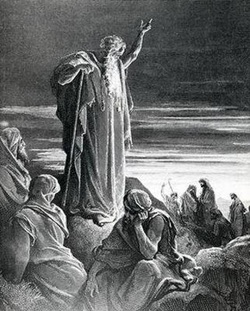 Ezekiel's Preaching - Gustav Dore In warfare during the Ancient Near East (ANE), warring states typically also meant warring religions due to local gods and tribal deities. Thus, the victory of a certain people was often translated into the victory of their god over the vanquished people's god as well. With this background in mind, Luc argues that Ezekiel did not see the impending Babylonian exile as a political problem, but a theological problem. Ezekiel was concerned first and foremost with God's name and that Israel's history resulted from God's concern for His own name. Luc demonstrates that Israel only survived many bouts of apostasy because God withheld His wrath “for the sake of my name” and “...to keep his name from being profaned 'in the yes of the nations'” (Luc, 138). However, stemming judgment led to increasing levels of sin and rebellion in both Israel and Judah as represented by the the story of the two sisters: Oholah and Ohlibah in chapter 23. The result was that punishment could no longer be withheld for according to Luc each sister had “...forgotten Yahweh and marred his reputation by her sinful deeds...” (Luc, 139). As a result, Israel's apostasy, not Babylon, was the real cause of the crisis. Babylon would simply be the tool that God used to destroy his own people for the sake of His name. Luc points out that unlike typical ANE thinking, “...the crisis was not to be considered a sign of God's weaknesses...” due to “...Ezekiel's use of the recognition formula: 'then you (they) will know that I am Yahweh.'” (Luc, 140). In order to prove this to the exiles and the foreign nations, God promised not only to restore Israel, but also to judge her oppressors (one-sixth of the book of Ezekiel is composed of oracles against the nations). This promise of restoration is likely the only thing that kept the exiles' hope of continuation in the future alive. For if God did not convince them of His future plans and salvation for them as a people, there seems little reason for them to ever plan on returning. The visions of both the valley of dry bones where God would resurrect his people and fill them with His Spirit, and the new temple reveal that God still wants them to know Him as their God. Personal Observations – God's dilemma, or catch-22, regarding how to preserve the reputation of His name in light of Israel's rebellion is clearly revealed by Luc. For if God does not act, the people who bear His name would most certainly tarnish it with their rebellious acts and immoral behaviors that exceeded even those of the Canaanites who they drove from the land. Conversely, if God puts an end to Israel's prostitution and fornication, whether by driving them from the promised land or by eradicating them altogether, the surrounding nations will see God's name as weak or at least inferior to their false god. God's choice to drive His people from the land with the caveat that He would one day restore them shows the history of the exile as a logical solution to halt Israel's corruption without doing irreparable damage to God's name. What seems most striking about this interaction is the timelessness of the situation. It would not be difficult to see this identical dilemma play itself out at any stage during Israel's history or the Christian Church's history. In fact, God may be experiencing a modern catch-22 as demonstrated by the common phrase said today that “the worst advertisement for Christianity is a Christian.” Modern Christians would do well to put God's name and reputation first before engaging in ministry or even personal activities since “we are surrounded by such a great cloud of witnesses” (Hebrews 10). The article also raised some interesting academic details without getting “lost in the weeds.” The origin of the formulaic phrase “then you will know that I am Yahweh” apparently plays a large role in Ezekiel's ministry, but few would assume that it did not originate with Ezekiel. However, Luc points out that his adoption of the phrase in everything he proclaims indicates that Yahweh will reveal himself to the people and the nations in some way for each pronouncement of punishment or restoration. It certainly is interesting to see that, in the words of Luc, “...the formula functions as a prediction of vindication of Yahweh's reputation as well as of the prophet's credibility” (Luc, 140). In other words, Yahweh's words are as good as done.
0 Comments
Leave a Reply. |
AuthorBrett Yardley: Categories
All
Archives
January 2019
|

